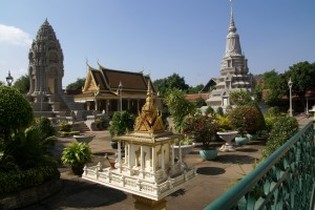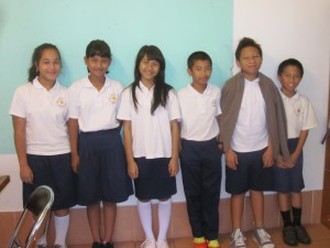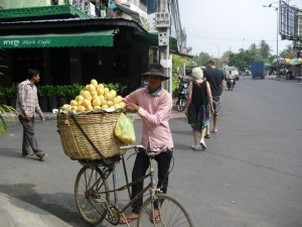
This is another installment of Cedar’s Digest, a series of poetic stories about the experiences my husband, Ren Ruslan Feldman, and I are having living for six months in Central Borneo. We are volunteer teachers in a small, innovative Indonesian school. The school is child-centered with a focus on hands-on learning and character development. Classes are taught in English and Indonesian.
“Madame, there are no flights available to Siem Riep and the Temples?
So, I can arrange something really good for you.
You take the bus, leaving this afternoon in an hour.
A.C. and comfortable.”
We wait for the lovely and friendly hotel manager, Sambath, to check on this.
She returns. “Bus has only 1 seat left. I have another idea.
A taxi with a driver. It is a 5 hour ride. A.C. of course,
and the driver speaks English. A little more expensive,
but then you go whenever you want and come back whenever you want.
Leave maybe 6 am and get there by noon. Then a tour guide for the temples.
And I have a boutique hotel for $44 US for the night.
Okay? It will be good. I will make arrangements for you?”
Khmer is her first language, French is her second.
We sit by the pool and wait.
“Yes, Madame et Monsieur, it is arranged for you.
And is it okay if I send along one of the young women
who works here with you. This is a new trip and I want her to
tell me how it goes. Is it okay?”
Thus begins one of the most memorable adventures of our lives…
“My name Chan,” says the driver.
“My name Reatrey (Re-try),” says our hotel companion
Chan is 25 and Reatrey is 22. She attends university and is studying
hospitality. She can speak good enough English that we can get along.
Chan has been studying English for a month or so at home with a CD.
When he has money, he takes a lesson.
He is shy to speak and when he does and we understand,
his smile lights up the whole car.
we learn two Khmer words: chup meaning stop, okun meaning thanks
Soon they are chattering away in Khmer in the front seat
with plenty of youthful energy
while we in the back seat
become totally absorbed in what we are seeing
5 hours each way of country life
for me, the scenes are compelling
I am taking thousands of eye photos
A mere 40 years ago, ALL the educated people in this area
were killed. Wearing glasses was enough of a sign.
The US laid down more bombs in Cambodia than in all of WW 2!
And today we Americans are treated with respect and warmth
The remains of war are invisible landmines and some bomb craters
that are now re-vegetated and look like water holes
And the people, the people carry on their lives
as they have for 1000s of years with a few upgrades
“My home is right up this road 40 kilometers.
I am going home on my motorbike next weekend for Khmer New Years.”
“What happens at Khmer New Years?”
“We clean out the house and wash the Buddha and make everything
clean for the new year. Everyone comes home to see family and for parties.
We give presents to grandmother and grandfather and parents.”
Chan adds, “If I have money, I give money. If I don’t have money,
I give a shirt or a dress.”
“And we visit the temple and leave a gift for the Buddha, and we drink and dance.”
Driving, as I now know it to be in developing countries,
is a combination of art, skill, luck, grace, and kindness of others.
Our driver is calm and steady and weaves in and out of other cars,
trucks, motorbikes, pedestrians, tuk tuks.
I try not to look, but hold my breath
as he moves around a truck head on into an oncoming car
that slows down just enough for a few feet of leeway
The a.c. doesn’t work very well in the back seat
It’s takes about an hour and a half before we get to a place
where we can get breakfast…thick coffee with condensed milk and noodle soup
in an open air market where we are the only white people in sight
Chan and Reatrey take good care of us.
From my window view of the passing world I see
a man with a big fat pig in a basket on the back of his motor bike
two orange-robed monks on a motorcycle
a man with an armload of palm sugar branches
ready to be juiced
a woman selling all kinds of exotic fruit
from her stand made of sticks lashed together
we stop and Reatrey buys a few things
we taste “lotus” (lowtuce, accent on the tuce) fruit…nutty
we don’t taste the crunchy black beetles that she loves
we pass a man balancing a ladder on his bicycle
a van with UN Human Rights painted on the side
a lexus
white Brahma cattle literally amble across the road
no one honks, they just slow down and let them pass
water buffalo are staked in the fields
Chan’s cell phone rings
men walk behind wooden plows in the fields
while Chan talks on the cell phone
During my 10 hours of viewing
I looked into thousands of little wooden homes
ranging from really, really poor with palm branch walls
to kind of middle-class
For a composite:
wooden posts in cement footings
hold up a square wooden structure
a story above the ground
there is a blue painted and decorated
stairway leading straight up to an open door
in the middle of the structure.
One small window on one side, open also
Walls are painted in a light blue
with the window frames a darker blue
a Buddhist orange cloth hangs at the top of the doorway
the roof is sheets of metal with 2 peaks to add length to the house
flowers are in pots at the base of the stairs
inside it is dark
“What is inside the house, Reatrey?
Are these like the house you grew up in?”
“Yes, just like this. Two rooms, no walls.
On one side we sleep. No, no beds.
We sleep on the floor. We have a pillow
made of cotton (cot-tone, accent on the tone) from a tree here.
No, no counters. In the kitchen we squat down and cook.
We cook with a fire. We make a fire with a lighter.
No, no grill. We have a piece of cement on the floor.
We put rubber on the cement. Yes, rubber from the rubber tree.
Then we light it and put little sticks on to make a fire
and then we put the rice in the pot on the fire.
No running water. Electricity for a black and white tv
comes from and old car battery (bat-tree, emphasis on tree).”
Underneath the house
is where most daily life happens
always a big table in the middle of the space
under the house
people sit or squat on the table,
boxes and bags of rice are arranged on the ground
a bicycle, a neat pile of wood
a hammock with a sleeper in it
red plastic chairs
people squatting
things in plastic bags hang from the posts
clothes hang on a wooden rack
lots of things in the space
all neatly arranged
a lashed, wide open weave wooden fence surrounds
a brahma cow although the fence would never hold a cow that didn’t want to be there
a 15 foot high haystack organized around a center pole
a dug out water hole the size of a swimming pool
to store water from the rainy season
a very large round pot or three to hold water from the village well
a tarp on the ground holds unhusked rice drying out
a woman pushes the rice around with a little broom
a richly painted gold and yellow and orange family shrine
“How did you decide you wanted to go to university?”
“When I was very little, my mother asked me what I wanted to do when I grew up.
I said I wanted to be a doctor and go to university. She said, ‘okay.’
Yes, I’m the first one in the family to go to university. I just always knew it.
My parents are rice farmers. I don’t want to be a rice farmer.
It is very hard work, all the time. My mother also has a little store.
I changed my mind about doctor.
Now I want to run a hotel. Yes, my Dad is very proud of me.
I like going home.”
I am very interested in Reatrey’s life and her family life.
The information from these conversations
come together like the pieces of a patchwork quilt
made of tender persistence and careful listening
for example, when I asked her how the fire didn’t burn the floor,
Reatrey looked amazed that I didn’t know about the cement slab
I am reminded of the south sea islanders who purportedly
couldn’t see a clipper ship because they didn’t know about ships
She did well, translating her world to me
Cambodia is 95% Buddhist.
Every few kilometers we pass a glittering temple
gold, orange, yellow, red and ornate
plain, high walls and very richly decorated roof edgings
in towns, they are the center of town
in the country
we see a fancy arch
and then my eye traces down a long, long dirt road
a highway of my imagination as I consider what temple, what town,
what ordinary extraordinary things might be down this road
so open and yet so clearly leading somewhere as yet unseen
“Madame, there are no flights available to Siem Riep and the Temples?
So, I can arrange something really good for you.
You take the bus, leaving this afternoon in an hour.
A.C. and comfortable.”
We wait for the lovely and friendly hotel manager, Sambath, to check on this.
She returns. “Bus has only 1 seat left. I have another idea.
A taxi with a driver. It is a 5 hour ride. A.C. of course,
and the driver speaks English. A little more expensive,
but then you go whenever you want and come back whenever you want.
Leave maybe 6 am and get there by noon. Then a tour guide for the temples.
And I have a boutique hotel for $44 US for the night.
Okay? It will be good. I will make arrangements for you?”
Khmer is her first language, French is her second.
We sit by the pool and wait.
“Yes, Madame et Monsieur, it is arranged for you.
And is it okay if I send along one of the young women
who works here with you. This is a new trip and I want her to
tell me how it goes. Is it okay?”
Thus begins one of the most memorable adventures of our lives…
“My name Chan,” says the driver.
“My name Reatrey (Re-try),” says our hotel companion
Chan is 25 and Reatrey is 22. She attends university and is studying
hospitality. She can speak good enough English that we can get along.
Chan has been studying English for a month or so at home with a CD.
When he has money, he takes a lesson.
He is shy to speak and when he does and we understand,
his smile lights up the whole car.
we learn two Khmer words: chup meaning stop, okun meaning thanks
Soon they are chattering away in Khmer in the front seat
with plenty of youthful energy
while we in the back seat
become totally absorbed in what we are seeing
5 hours each way of country life
for me, the scenes are compelling
I am taking thousands of eye photos
A mere 40 years ago, ALL the educated people in this area
were killed. Wearing glasses was enough of a sign.
The US laid down more bombs in Cambodia than in all of WW 2!
And today we Americans are treated with respect and warmth
The remains of war are invisible landmines and some bomb craters
that are now re-vegetated and look like water holes
And the people, the people carry on their lives
as they have for 1000s of years with a few upgrades
“My home is right up this road 40 kilometers.
I am going home on my motorbike next weekend for Khmer New Years.”
“What happens at Khmer New Years?”
“We clean out the house and wash the Buddha and make everything
clean for the new year. Everyone comes home to see family and for parties.
We give presents to grandmother and grandfather and parents.”
Chan adds, “If I have money, I give money. If I don’t have money,
I give a shirt or a dress.”
“And we visit the temple and leave a gift for the Buddha, and we drink and dance.”
Driving, as I now know it to be in developing countries,
is a combination of art, skill, luck, grace, and kindness of others.
Our driver is calm and steady and weaves in and out of other cars,
trucks, motorbikes, pedestrians, tuk tuks.
I try not to look, but hold my breath
as he moves around a truck head on into an oncoming car
that slows down just enough for a few feet of leeway
The a.c. doesn’t work very well in the back seat
It’s takes about an hour and a half before we get to a place
where we can get breakfast…thick coffee with condensed milk and noodle soup
in an open air market where we are the only white people in sight
Chan and Reatrey take good care of us.
From my window view of the passing world I see
a man with a big fat pig in a basket on the back of his motor bike
two orange-robed monks on a motorcycle
a man with an armload of palm sugar branches
ready to be juiced
a woman selling all kinds of exotic fruit
from her stand made of sticks lashed together
we stop and Reatrey buys a few things
we taste “lotus” (lowtuce, accent on the tuce) fruit…nutty
we don’t taste the crunchy black beetles that she loves
we pass a man balancing a ladder on his bicycle
a van with UN Human Rights painted on the side
a lexus
white Brahma cattle literally amble across the road
no one honks, they just slow down and let them pass
water buffalo are staked in the fields
Chan’s cell phone rings
men walk behind wooden plows in the fields
while Chan talks on the cell phone
During my 10 hours of viewing
I looked into thousands of little wooden homes
ranging from really, really poor with palm branch walls
to kind of middle-class
For a composite:
wooden posts in cement footings
hold up a square wooden structure
a story above the ground
there is a blue painted and decorated
stairway leading straight up to an open door
in the middle of the structure.
One small window on one side, open also
Walls are painted in a light blue
with the window frames a darker blue
a Buddhist orange cloth hangs at the top of the doorway
the roof is sheets of metal with 2 peaks to add length to the house
flowers are in pots at the base of the stairs
inside it is dark
“What is inside the house, Reatrey?
Are these like the house you grew up in?”
“Yes, just like this. Two rooms, no walls.
On one side we sleep. No, no beds.
We sleep on the floor. We have a pillow
made of cotton (cot-tone, accent on the tone) from a tree here.
No, no counters. In the kitchen we squat down and cook.
We cook with a fire. We make a fire with a lighter.
No, no grill. We have a piece of cement on the floor.
We put rubber on the cement. Yes, rubber from the rubber tree.
Then we light it and put little sticks on to make a fire
and then we put the rice in the pot on the fire.
No running water. Electricity for a black and white tv
comes from and old car battery (bat-tree, emphasis on tree).”
Underneath the house
is where most daily life happens
always a big table in the middle of the space
under the house
people sit or squat on the table,
boxes and bags of rice are arranged on the ground
a bicycle, a neat pile of wood
a hammock with a sleeper in it
red plastic chairs
people squatting
things in plastic bags hang from the posts
clothes hang on a wooden rack
lots of things in the space
all neatly arranged
a lashed, wide open weave wooden fence surrounds
a brahma cow although the fence would never hold a cow that didn’t want to be there
a 15 foot high haystack organized around a center pole
a dug out water hole the size of a swimming pool
to store water from the rainy season
a very large round pot or three to hold water from the village well
a tarp on the ground holds unhusked rice drying out
a woman pushes the rice around with a little broom
a richly painted gold and yellow and orange family shrine
“How did you decide you wanted to go to university?”
“When I was very little, my mother asked me what I wanted to do when I grew up.
I said I wanted to be a doctor and go to university. She said, ‘okay.’
Yes, I’m the first one in the family to go to university. I just always knew it.
My parents are rice farmers. I don’t want to be a rice farmer.
It is very hard work, all the time. My mother also has a little store.
I changed my mind about doctor.
Now I want to run a hotel. Yes, my Dad is very proud of me.
I like going home.”
I am very interested in Reatrey’s life and her family life.
The information from these conversations
come together like the pieces of a patchwork quilt
made of tender persistence and careful listening
for example, when I asked her how the fire didn’t burn the floor,
Reatrey looked amazed that I didn’t know about the cement slab
I am reminded of the south sea islanders who purportedly
couldn’t see a clipper ship because they didn’t know about ships
She did well, translating her world to me
Cambodia is 95% Buddhist.
Every few kilometers we pass a glittering temple
gold, orange, yellow, red and ornate
plain, high walls and very richly decorated roof edgings
in towns, they are the center of town
in the country
we see a fancy arch
and then my eye traces down a long, long dirt road
a highway of my imagination as I consider what temple, what town,
what ordinary extraordinary things might be down this road
so open and yet so clearly leading somewhere as yet unseen



 RSS Feed
RSS Feed